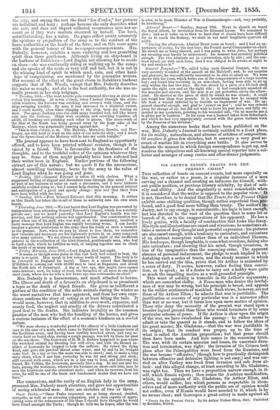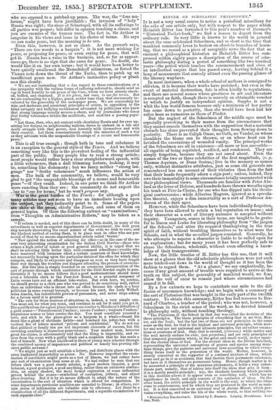SIR ARTHUR ELTON'S TRACTS FOR THE ' PRESENT CRISIS. * Tars
collection of tracts on current -events, but more especially on the war, or rather on a peace, is a singular instance of a man carving out a channel and creating an influence for himself, with- out public position, or previous literary celebrity, by dint of acti- vity and ability. And the singularity is more remarkable when it is considered that the writer is opposed to the popular view...At is not, therefore to be denied that the Tracts for the Present 0 e• • exhibit some striking qualities, though rather superficial than found, and a good deal more telling than treaty. The author's.a.- dusty, not to say energy, is considerable ; his logic is keen enough; but less directed to the root of the question than to some bit or branch of it, or to the exaggerations of his opponent. He has a lively genius, with a faculty of combination that looks like fancy. His style and illustrations are smart and vivacious; he sometimes at- tains a union of deep thought and powerful expression : his pictures are also smart enough, with a tendency to caricature, and caricature of an abstract conception rather than of an individual likeness. His burlesque, though laughable, is somewhat overdone, falling also into caricature ;' and showing that his mind, though vivacious, is less of the imaginative than the reasoning order. The apparent absence of personal inducement, the pledge to work implied in un- dertaking such a series of tracts, and the steady manner in which he has carried out the idea, prove that Sir Arthur is animated by a sense of duty. It seems, however, rather feeling than convic- tion, so to speak; as if a desire to carry out a hobby were quite as much the impelling motive as a well-grounded principle. This want of solidity is traceable in Sir Arthur's arguments; which are somewhat shifty. A Peace-man who denies the lawful- ness of war may be wrong, but his principle is broad, and appeals to the milder sentiments of mankind. Such views, however, are not those of Sir Arthur Elton ; he admits that war is justifiable. The justification or censure of any particular war is a narrower affair than war or no-war, but it turns less upon mere matter of opinion. Those who deny die necessity of the present war stand upon a broader logical ground than those who would terminate it by some particular scheme of peace. If Sir Arthur is clear upon the origin of the war, we have overlooked the passage : he rather seems to admit,or take the quarrel as it stands, and to follow the ideas of his great master, Mr. Gladstone,—that the war was justifiable in its origin ; that its conduct was proper, up to the time of what is called the Austrian proposition ; but that peace should then have been made. And here comes in the reasoning hitch. The war' with its certain miseries and losses, its uncertain dura- tion and termination, was right: the invasion of the Crimea took place after the Principalities were freed from the Russians, and the war became "offensive," (though how to practically distinguish between offensive and defensive fighting is not easy,) and was car- ried on after Turkey was freed from invasion and safe from at- tack : and this alleged change, at least according to Mr. Gladstone, was right too. Then we have a proposition narrow enough in it- self, which Russia rejects; then comes the Austrian modification, which, in the opinion of Mr. Gladstone, Sir Arthur Elton, and others, would suffice, but which persons as respectable in them- selves and of more authority with the public are of opinion would not suffice, even if Bkria would have acceded to it, which is by no means clear; and thereupon a great outcry is made against all • Tracts for the Present Crisis. By Sir Arthur Hallam Elton, Bart. Published by Kerslake, Bristol. • who are opposed to a patched-up peace. The war, the "forts ma- lornm," might have been justifiable ; the invasion of " holy " Russia was right; the siege of Sebastopol, with all its sufferings to all parties wasproper ; but differ in opinion touching a clause, and you are" enemies of the human race. The fact is, Sir Arthur is sanguine in his views and loose in his choice of terms. He says we can make peace, but the meaning is he can. Even this, however, is not so clear. As the proverb says, "There are two words to a bargain"; it is not mere wishing fur peace, or protosing for peace, or even crying for peace, that will • get it. Russia has a voice in the business, and, so far as appear- ances go, there is no Sign that she cares for peace. No doubt, she would like it on her own terms ; but it would have been better to have quietly swallowed the Menschikoff ultimatum, or forced the Vienna note down the throat of the Turks, than to patch up an insufficient peace now. Sir Arthur's instinctive policy or plunk sees this clearly. "We are not contending that a due regard to these considerations, or a due sympathy with the various forms of suffering referred to, should send us cap in hand humbly to ask peace of the Czar, whom we have already check- ed, baffled, and chastised. It is his place, not ours, to sue for terms. But we are contending for a higher, purer, nobler tone than that strenuously in- culcated by the generality of the newspaper press. We are contending for wise and moderate and consistent principles of action, in opposition to the blind savagery and bullying recklessness advocated by politicians who know that strong language usually secures a cheer, and by journalists who fancy that frothy vehemence tickles the multitude, and snatches a passing popu- larity. "Let those, then, who, not content with chastising Russia and for ever up- setting her designs on neighbouring nations, desire to embark in a life and death struggle with that power, deal honestly with themselves and with their country. Let them conscientiously weigh the miseries of such a war as they advocate with the unspeakable blessings of a secure and honourable peace."
This is all true enough ; though both in tone and substance it is an exception to the general style Of the Tracts. And we believe
something very like this is the prevalent feeling of the influential part of the public. Many people like to read a strong article; most people would rather hear a clear straightforward speech, with a little vehemence, than a dull trimming lecture, looking, it may be, something like dishonesty ; but we fancy neither "strong lan- guage" nor "frothy vehemence" much influences the action of
men. The bulk of the community, we believe, would be very glad to get "the unspeakable blessings of a secure and honourable peace "—if they could. Indeed, in one point we think Sir Arthur more exacting than they are : the community do not expect the aar to "sue for terms, but he won't propose any. War is the great burden of the Tracts ; for although a good many articles may not seem to have an immediate bearing upon the subject, yet they indirectly point to it. Some of the papers are skits at the press, chiefly the Times, and some of them on general topics. Of these the following extract on "examinations," from "Thoughts on Administrative Reform," may be taken as a sample.
"If reform is needed, and of this there can be little doubt, in many of the subordinate as well as superior departments of Government, the first great step towards discovering the exact nature of the evils we wish to cure, and the likeliest method of curing them, is to place men in office who are pos- sessed of that by no means superabundant article called 'brains.'
"Now against the notion of selecting for office—as in the case of the re- cent very interesting examination for the Indian Civil Service—those who
evince a high order of talent or good general ability, it is urged that we
shall be selecting little better than well-crammed schoolboys—youths who have mastered with immense effort a certain' quantum of head knowledge,
not necessarily bearing upon the particular duties of the office for which they compete, and likely to evaporate and disappear as soon as they have fought their way though the troubles and dangers attending the process of examina- tion. But this idea is simply founded on an erroneous interpretation of the sort of process through which candidates for the Civil Service ought to pass. Certainly it by no means follows that a good mathematician should make
even a tolerable clerk to the Poor-law Board, or a graceful composer of Latin verses turn out an efficient tide-waiter. But even here, we confess, we should prefer as a clerk one who was proved to do something well, rather than an individual who is thrust into an office because his uncle is a busy politician in some corrupt borough, or because his aunt, the Lady Wilhel- mina Amelia, has indomitable powers of persuasion, and never stops asking for a favour until it is granted. "The rule for those desirous of situations is, indeed, a very simple one. You must ask for what you want, and continue to ask for it until you get it. The qualifications for a good place-hunter are similar to Idirabeau's definition of a good orator= Premidrement raudace ; encore raudace ; toujours raudace.' Impudence sooner or later carries the day. You must constitute yourself a bore, and stick to the place-giver as a harpoon to a whale—haunt his doors like a ghost of obstinate habits—and bombard his letter-box with a vertical fire of letters marked private and confidential.' We do not say that political or family ties are not important elements of success, but the crowning auxiliary is shameless perseverance. Your modest man, however great his claims, is affectionately told that the thing is impossible, and re- tires from the scene witlya guilty blush and a suspicion that he has made a fool of himself. Now what likelihood is there of young men selected through the combined agency of impudence and political or family ties proving effi- cient public servants "We might just as well establish a lottery, and distribute places with the same haphazard impartiality as prizes. No. However imperfect the exam- ination of candidates might prove as a test of fitness, we had rather have any sort of examination than none at all. We had rather be sure that our future clerk was a good classic scholar, a good modern linguist, a good botanist, a good geologist, a good anything, rather than an unknown abstrac- tion, an empty shadow, the mere formal expression of some influential person behind the scenes—symbolical of corruption, jobbery, and abject place-hunting. But it is by no means difficult to adapt the nature of the examination to the sort of situation which is offered for competition. In seine departments particular qualities are essential to fitness; in others, cer- tain stores of information are valuable aids to efficiency. Let there be a classification of all the different departments, and a separate examination for each separate class."



































 Previous page
Previous page